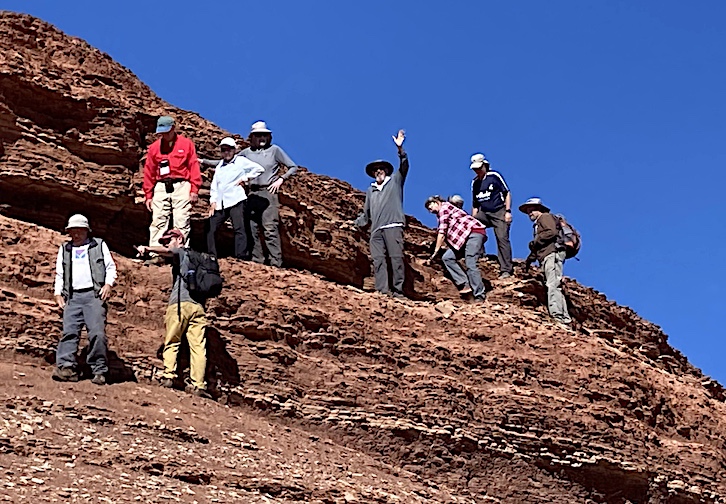
Stuart Schupack of Arizona raises his hand during a Road Scholar group hike to Cathedral Butte in northern Arizona. Photo by Jane Truesdale
By Mary Bergin
Nonprofit Road Scholar, which arranges study vacations for older adults, turns 50 in 2025. The Boston-based business began as Elderhostel with six participants studying early American history plus electives such as “Avocation in the Arts” and “The Conversation of Elderpower” at a New Hampshire college in 1975. By summer’s end, 220 older adults had enrolled in weeklong getaways, which have grown exponentially ever since.
“We were taking older adults to college campuses, where they would stay in the dorms, attend classes in the lecture halls and eat in the dining halls,” explains Kelsey Knoedler Perri, public relations director at Road Scholar. “It was kind of like a back-to-campus experience for folks to have a way to access education during retirement.”
Perri says the name changed to Road Scholar in 2010 to reflect changing attitudes from older adults about growing old. Boomers didn’t want to be referred to as “elderly” or “elders.”
Class content, locations evolve
What we have today is a global educational travel organization whose customers typically stay in hotels, not hostel-like accommodations. Around 4,900 itineraries for roughly 100,000 travelers per year cover more than 100 countries and all seven continents.
Road Scholar’s most popular trip themes run the gamut, as does the level of physical activity required. Think Irish literature, Greek antiquities, and natural wonders in the Scottish Highlands. More challenging, physically: regional history lessons during Appalachian Trail hiking and wildlife studies while whitewater rafting in Idaho.
A five-day Washington D.C. program concentrates on spy history and international espionage. Students delve into declassified materials and intelligence efforts associated with the Cuban Missile Crisis, Sept. 11 attacks in 2001 and lesser-known incidents of national importance. The featured speaker is a retired Central Intelligence Agency officer.
Eight days in the Deep South are all about the Civil Rights Movement. Floating campuses sail as far as Antarctica to study marine biology (penguins, seabirds) and geology (volcanoes, icebergs) for two weeks. Other adventures via water are abundant, be it on Asia’s Mekong River or the USA’s Great Lakes. One trip sails the French Canal by barge. Another uses a small ship to explore the Greek Isles.
“Being able to travel with like-minded peers with whom you can socialize and have intellectual discussions is one of the things our participants enjoy the most, along with the peace of mind that comes with leaving the trip planning and travel logistics to the experts so you can just sit back, relax and enjoy the learning,” Perri says.
The average Road Scholar participant is 72 years old and lives in North America; trip itineraries encompass four days to four months (plus one-hour, multi-day options for online learners). The ongoing expansion of choices addresses the divergent and changing needs, limitations, and interests of older adults.
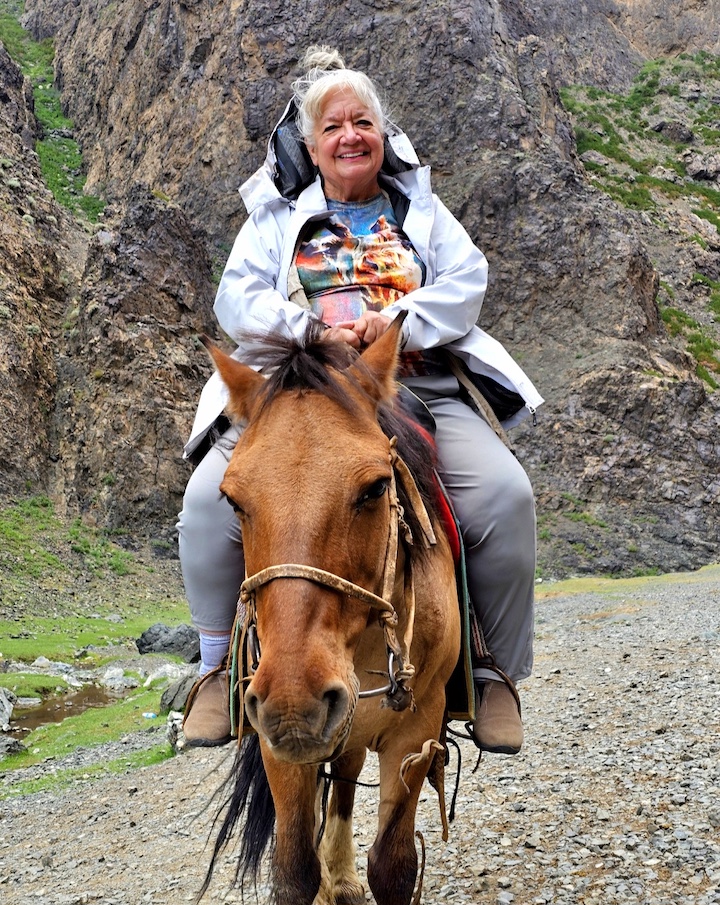
Paula Wright of Massachusetts is shown riding a horse in Mongolia during one of the estimated 40 trips she has taken with Road Scholar. Photo courtest of Paula Wright
Going solo
Paula Wright, 80, of Massachusetts, is a former aerospace engineering manager who has traveled with Road Scholar around 40 times, to places as dissimilar as Mongolia and Patagonia. “The depth of experiences and education I’ve received through their programs is beyond anything I’ve found elsewhere,” she says, praising the quality of instructors and instruction. Instructors are retired experts such as historians, scientists, and archeologists if those disciplines are attached to a trip.
Wright is among the 30 percent of Road Scholar participants who travel solo (of these, 85 percent are women and 60 percent are married). New in 2025 is a group of trips – to Louisiana, Lima, Italy, India, and elsewhere – specifically designed for solo travelers over age 50. It’s a demographic of travelers that Perri says is on the rise as more Baby Boomers reach retirement age and more women travel without a spouse.
“I am single, and before Road Scholar, took many trips on my own,” says Wendy Baldwin of Indiana, 69, a retired data analyst. Her mother loved traveling with Elderhostel during the program’s early years, so Baldwin gave it a try.
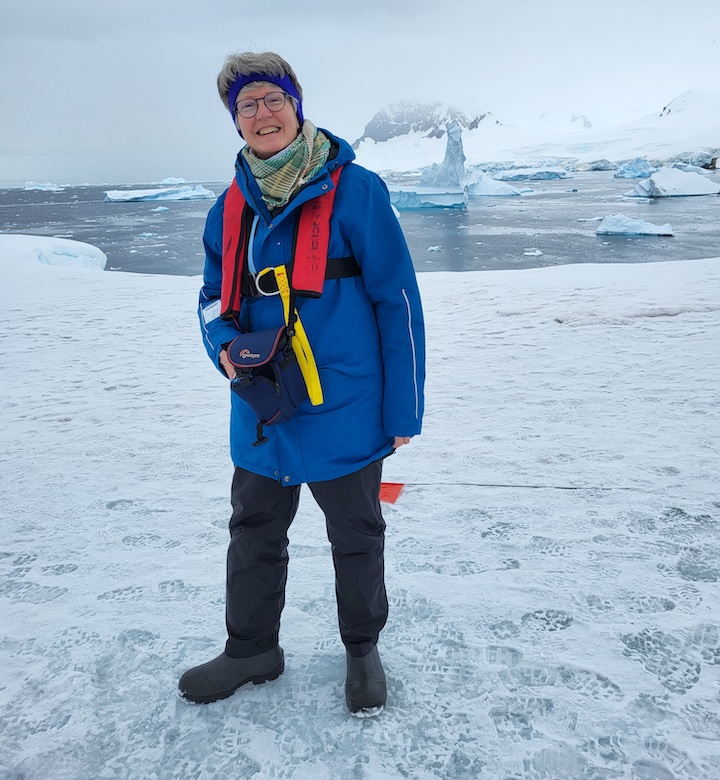
Wendy Baldwin of Indiana is shown during a Road Scholar trip to Antarctica. Photo by Nicole Flores Jara
Although uncertain about “group travel,” she enjoyed “the camaraderie of others, the great learning experiences, and the opportunity to do things that I wouldn’t try on my own.”
“I am interested in hiking in new places, but not always comfortable doing this on my own and did not have friends who wanted to do this,” says Stuart Schupack of Arizona, 78, a retired human resources consultant who recognizes the prudence and practicality of hiking with others as he grows older. “Road Scholar gives me the opportunity to explore these places safely while teaching me about the biology, geology and history of the area.”
Road Scholar hiking trips have taken him to Yosemite and Glacier national parks, the Oregon coast, Canadian Rockies, to Vermillion cliffs in Arizona, redwoods in California and Newfoundland. His most recent trip was not solo because he gained a travel partner (whom he met on a Road Scholar trip).
Active adventures
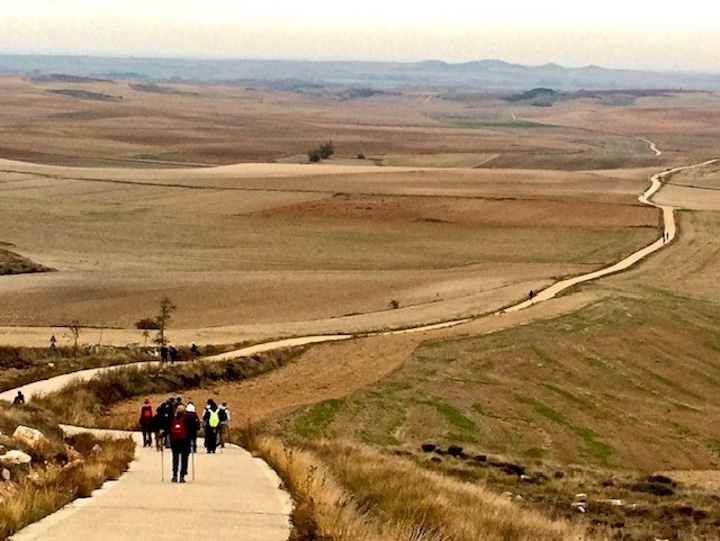
Paul Gottlieb of New York took this photo during a Road Scholar hike along the Camino Trail in Spain. Photo by Paul Gottlieb
These and other programs help redefine aging and buck ageist stereotypes, inspiring older adults to stay active and adventurous. Slower-paced programs for more sedentary seniors are available, but active outdoor offerings – be it bicycling or hiking – are plentiful too.
Another avid hiker is Paul Gottleib of New York, 78, a retired lawyer who says Road Scholar “keeps me young.” He has experienced various national parks, England’s Cornish coast, and the Camino de Santiago trail in Spain.
Retired teacher Elma Chapman of Indiana, 75, says she and husband Gary stick with Road Scholar “because it unlocks so much local culture that the average traveler would probably miss” and “it is an inclusive cost: when they tell you the cost, that’s the final cost – no add-ons or gratuities.” That typically means one fee for everything except transportation to the destination and personal expenses.
“We choose active trips that feature bicycling, kayaking and hiking,” she adds, “although as we age, we are looking at trips that offer shorter hikes or bike rides.”
Online Road Scholar offerings began in 2020, change from year to year and are a tiny part of the thousands of programs scheduled annually. Most recently, 18 online choices included studies of World War II London and Normandy, British murder mysteries – facts vs. fiction, and philosophical introductions to religions of the world.
Adding a generation

Vicki Edelnant and her father Glen Van Vark of Iowa are shown during a Road Scholar New Year’s Eve dinner party in Pasadena, Calif. Photo by Vicki Edelnant
Dozens of Road Scholar trips are designed for two-generation family participation, but it’s not a one-dimensional approach. Although a grandchild as young as age five can participate with a grandparent, the average age is 11 or 12.
Other combos of relatives work too. Vicki Edelnant of Iowa went on Road Scholar trips with her father when he was in his 80s and had significantly limited mobility. One fond memory was working on a float with him, for the Rose Parade in Pasadena, Calif.
Retired physical therapist Kathleen Okorn of Ohio, 73, brought college-aged granddaughter Maeve on a two-week, seaside hiking trip in Croatia. “She picked the location, and I picked the tour provider,” Okorn says. All went well.
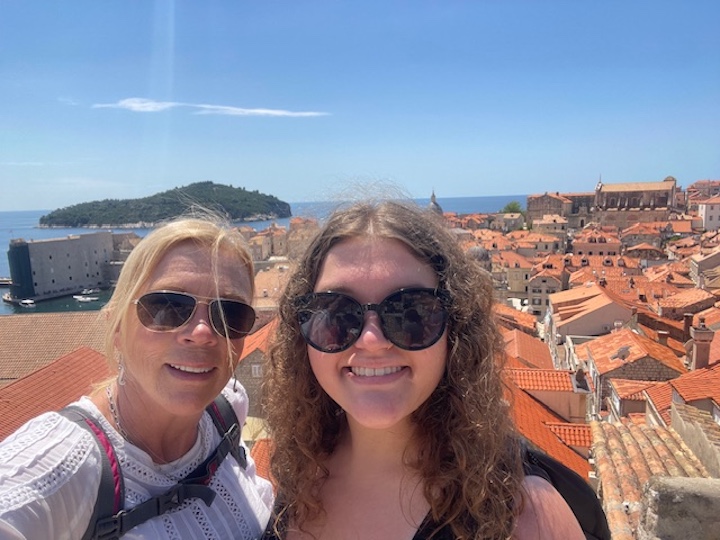
Kathleen Okorn of Ohio and granddaughter Maeve take a break while walking the city wall in Dubrovnik, during a Road Scholar trip to Croatia. Photo by Kathleen Okorn
Itineraries build in time for independent exploration, plus behind-the-scenes experiences, such as backstage access at a renowned theater with a stage actor, to a hands-on cooking lesson in the kitchen of a local family.![]()
Mary Bergin’s last story for EWNS was about how all-inclusive resorts are evolving.

